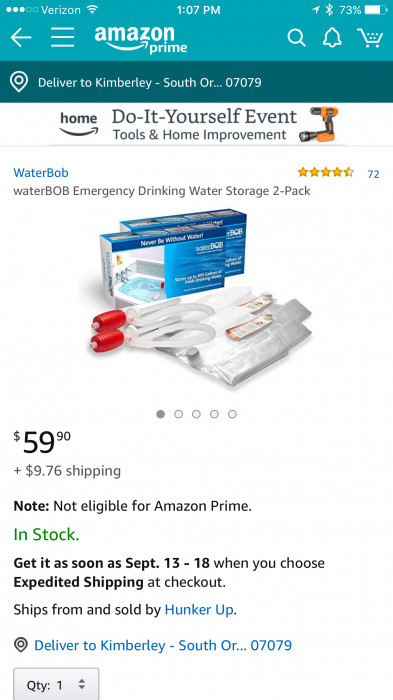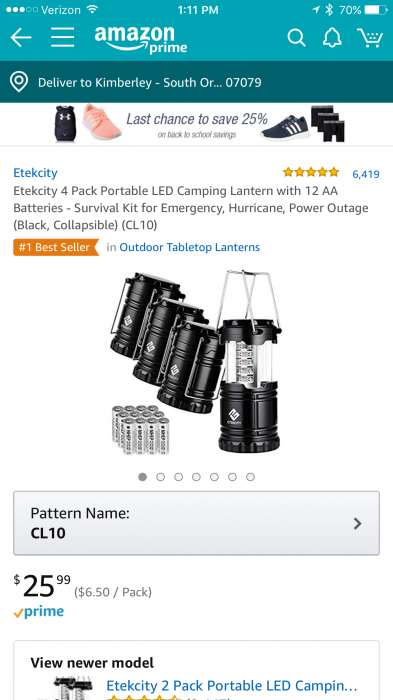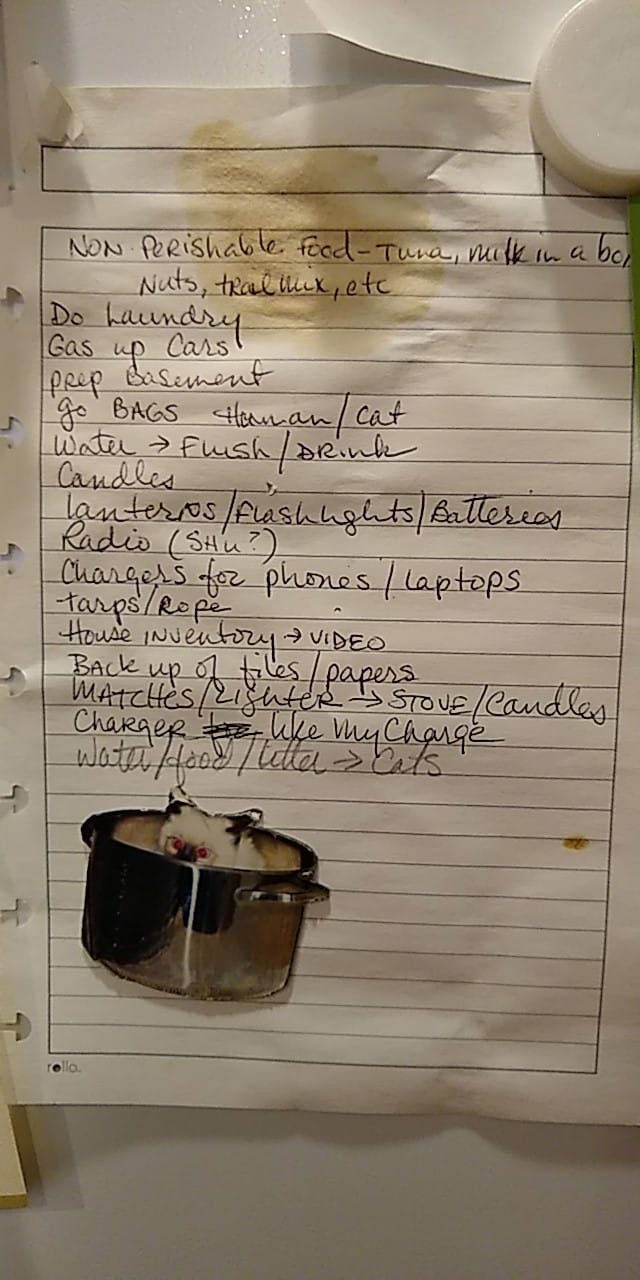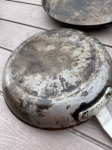Hurricane and Storm Preparedness
Anyone have a favorite lantern? I'm always curious about this one when I see the ad:
Also, would love to know what the system is to run a natural gas furnace.We have lanterns,head lamps, massive amounts of back-up batteries, hurricane lamps (huge candles), etc. in one box. There are flashlights on every floor. We store several gallon containers of water as well as wine and hard liquor.
Since we have a gas stove its easy to cook on the stovetop - there's always pasta, ingredients for soup/stews, oatmeal, etc. in the pantry.
We both tend to keep at least half a tank of gas in our cars, but will fill them up whenever the forecast looks wonky.
Newer stoves have electronic ignitions but I'm thinking we could bypass that with a simple match if necessary? I'm beyond aggravated that our gas powered furnace has, per state regs apparently, an electronic ignition that cannot be bypassed in the event of a power outage. We learned this the HARD way during Hurricane Sandy. I understand it is a safety feature but I also understand regulatory overkill.
nakaille said:
Newer stoves have electronic ignitions but I'm thinking we could bypass that with a simple match if necessary? I'm beyond aggravated that our gas powered furnace has, per state regs apparently, an electronic ignition that cannot be bypassed in the event of a power outage. We learned this the HARD way during Hurricane Sandy. I understand it is a safety feature but I also understand regulatory overkill.
An electrician can add a plug in that can be run from a generator or battery backup.
I learned a lot from the Irma experience here in FL last year. The storm was bad, but the week+ without power after was worse. I've added a few things to my hurricane supplies as a result:
battery powered fans (like this: https://www.amazon.com/O2COOL-Battery-Operated-Adapter-Graphite/dp/B00ATSHJ1Q)
Sterno folding camp stove (for coffee etc) https://www.homedepot.com/p/Sterno-CandleLamp-Emergency-Preparedness-Kit-70155/207084920
power bank to charge phones
Lanterns: this one is great: https://www.amazon.com/UST-Portable-Lifetime-Emergency-Survival/dp/B00DUPV60K/ref=sr_1_2?ie=UTF8&qid=1536596918&sr=8-2&keywords=30+day+lantern
and if you know anyone who gets Blue Apron delivery, get some of their frozen packs, they last much longer than ice or regular icepacks.
After the outages with Irene and the longer one after the Halloween storm that year, we decided to invest in a standby generator which can power sufficient a/c in the summer and heat in the winter for the house and also, with judicious usage, allows us to keep the fridges running, lights as needed and even do a wash load if necessary (I turn off the a/c when I run the washer when we are on generator power, though, just in case).
It wasn't cheap, and did require permits and dealing with both Maplewood and PSE&G - and where it can be placed is pretty tightly regulated so I lost one of my preferred flower beds, but it does give us peace of mind. After Sandy we were OK and were able to store perishables for our neighbors and let them charge their electronics or come by and plug in their laptops when they needed to be online for a while.
Still have lanterns and batteries (because you never know!) and keep some non-perishable food items handy.
If a bad storm is predicted, I will fill up pots and extra storage bottles with water since the water systems can be overwhelmed, making water not drinkable for a while.
nakaille said:
Newer stoves have electronic ignitions but I'm thinking we could bypass that with a simple match if necessary? I'm beyond aggravated that our gas powered furnace has, per state regs apparently, an electronic ignition that cannot be bypassed in the event of a power outage. We learned this the HARD way during Hurricane Sandy. I understand it is a safety feature but I also understand regulatory overkill.
The principal reason behind electronic ignition is not safety, but rather efficiency. The old way to ignite the boiler was a standing (always burning) pilot, that burned even when there is no call for heat. These standing pilot lights do not exist on an electronically ignited boiler. The electronic ignition cannot be “bypassed”. It is not about safety regulations or regulatory overkill.
This seems like a handy thing for 21 bucks.
https://electronics.woot.com/offers/charging-dock-w-four-backup-batteries
Basically you can keep four days of phone charging power backed up all the time.
jamie said:
Anyone have a favorite lantern? I'm always curious about this one when I see the ad:Also, would love to know what the system is to run a natural gas furnace.
Check out the lantern in my post above. I've bought several lanterns, but this one is the only one really bright enough to read by, and it has excellent battery life. Recommended by Wirecutter.
GoSlugs said:
nakaille said:An electrician can add a plug in that can be run from a generator or battery backup.
Newer stoves have electronic ignitions but I'm thinking we could bypass that with a simple match if necessary? I'm beyond aggravated that our gas powered furnace has, per state regs apparently, an electronic ignition that cannot be bypassed in the event of a power outage. We learned this the HARD way during Hurricane Sandy. I understand it is a safety feature but I also understand regulatory overkill.
That's what I did, but lots of debate ensued here on maplewood online weather that was up to code. You can get a simple transfer switch for about $120 that allows you to run a single circuit via an extension cord to a generator or battery backup. Then you would need an electrician to install it properly, unless you are very comfortable working inside your own electrical panel. It's also the kind of thing you would want to get a permit for, because if you go to sell your house people are going to ask about it. It's actually a nice feature but if you can't produce the permit paperwork some people may have second thoughts about buying your house.
It was an investment of about another $200 to get the battery backup setup. I bought what is called a marine battery, which is very similar to a car battery. However it is designed to allow what is called Deep discharge. Your car battery is not designed to get drained down to almost empty without sustaining some damage. A marine battery is designed so that you can pretty much use all of the capacity before recharging it. That makes it very useful if you're on a boat out at sea and running lights or a fridge or your fish tracker. It also is useful if you want to power a couple of things in your house for an extended period of time until the battery runs out.
I then bought something that is called a 12-volt power inverter which has clamps that go on the battery and then a couple of standard 120 volt outlets that you can plug things into.
The last thing you need is something to charge the battery with. You can get a simple battery maintenance device which you keep the battery connected to. You then keep it plugged in and uses a trickle charge to keep the battery at full capacity all the time. Then when you need it it's fully charged. The tricky thing there is if you want to charge the battery fully from being completely discharged it takes a long time. So I actually have a regular battery charger that can go slow medium or fast.
The whole megillah including the electrician will probably set you back five or six hundred bucks. You could probably get yourself a decent generator for that same amount of money, but it doesn't solve the problem of having to run your boiler off the generator. Wiring your boiler with a simple plug is probably a lot cheaper but harder to make a case for it being code compliant. The nice thing about the backup battery is that it's quiet, it's fairly easy to deploy if you have a short power failure and doesn't require a supply of fuel. The disadvantage is you need a way to keep the battery charged, which could be a neighbor's house that has power. There's ways to do it from your own car while you're driving around during the day. There are actually some solar panels you can buy to charge a 12 volt battery, but I haven't invested in one of those yet.
fill up your car with gas and have an extra can filled with gas at the ready. And get your BBQ propane tank filled pus a backup- might be your only way to cook food.
Go early if asked to evacuate and know where you will go. Don’t get caught in the traffic jams or find yourself confused about which direction to go in.
nakaille said:
Newer stoves have electronic ignitions but I'm thinking we could bypass that with a simple match if necessary? I'm beyond aggravated that our gas powered furnace has, per state regs apparently, an electronic ignition that cannot be bypassed in the event of a power outage. We learned this the HARD way during Hurricane Sandy. I understand it is a safety feature but I also understand regulatory overkill.
You can light a stove burner with a match, but you can't use your oven since it is electrically controlled.
conandrob240 said:
fill up your car with gas and have an extra can filled with gas at the ready. And get your BBQ propane tank filled pus a backup- might be your only way to cook food.
Go early if asked to evacuate and know where you will go. Don’t get caught in the traffic jams or find yourself confused about which direction to go in.
No, don't keep a spare can of gas around. It's very dangerous, and the shelf life is limited. You could keep an empty can around and use a siphon to take it from your car.
You could keep an empty can around and use a siphon to take it from your car.
I found out the hard way that most newer cars have anti-siphon gas tanks, so you can't actually siphon gas out of them. That was my plan to run our generator during the Sandy aftermath, and I was left high and dry with a generator and no gas to run it.
it’s dangerous to store a small can of gas in your garage right before an emergency? After Irma, and seeing gas lines/shortages, I think I’d take the chance.
I've gotten other bell and howell products and thought they were crap, typical as seen on TV junk.
some cars can't be siphoned for gas, mine can't and its a 2005 dodge, they put some mechanism in it.
when I replaced my range a few years ago, I purposely got one battery operated, its a basic model, but I don't cook much and the oven (and stove without a hassle) will work. i did read that at least some stoves can manually lit, but not usually the oven.
as far as charging phones, i would use my car, they make devices so you can plug in multiple things at once.
I've taken this storm as a reminder to update my supplies - something I've been needing to do for awhile...some food was expired or pilfered by kids, some batteries maybe old. Some water in gallons was evaporating. New items to add.
So I've ordered more, changed out water. Refilling propane.
We have some portable chargers and always charge all devices before storms but ordered that charging station you posted, @mrincredible!
In addition to the stuff others have mentioned (including headlamps for everyone and several led lanterns, flashlights), I have supplies to be able to do a repair (some plywood, tarps, "slaphammer" stapler, prybar, rope, duct tape, masks, gloves), fire extinguisher, matches, long lighter. All but wood stay with emergency supplies.
I have a very robust first aid kit and manual that stays with supplies.
I have a gas fireplace that throws heat, gas BBQ, gas stove. But I also have a camp stove and a hose to hook to big propane instead of only the small bottles in case problem with gas line. And general camping gear.
My car has a regular outlet. (When youngest was little he used a nebulizer and so I've always made a car outlet a priority). Always gas up before storm. Have additional containers.
I have cooler ice packs in freezer and if storm is coming I freeze containers of water to act as additional ice that could also be drinking/washing/flushing water.
I have printed out a booklet on emergency prep/response and tabbed it. It stays with supplies.
I have some reusable non BPA 3gal water jugs that are portable and also some of the big water cooler bottles and pump (see below) and a bathtub liner. Also a filter and water treatment tabs.
Stuff for pets.
Chemical toilet that stores other supplies.
We don't keep go-bags packed but I gathered for Sandy.
A friend posted this to-do list (below) that's handy to get ready for weather
But we don't have a generator...thought about it - not sure how I would do it...that's on the longer-term list of prep to consider. We have generally been lucky.
Trees. Take a good look at the trees on your property and trim back anything that could cause major damage.
When we moved in a few months ago we had two very old maples that were well over 60' tall and only about 10' from our house, both were leaning towards the house, and both weren't looking and feeling their very best. One dropped a major branch during a spring storm before we closed, though luckily that one missed the house but it let me know they weren't in the best condition. Having them removed wasn't cheap, but we decided due to their condition and location it was the best thing to do. From the outside the trunks looked fine, but once they were down we saw that one was rotted out to about 5' above the ground, the second tree was rotted out all the way to a few feet underground.
One thing that has been on my mind during the lead up to this storm is what would happen to NJ Transit if a storm like this were to hit us. Things are such a mess as they stand, I can't imagine the system has much resilience.
I do't know how you prepare for that, other than getting a job that allows you to telecommute.
Rentals
For Sale
-
leather couches $300
More info
Garage Sales
-
Multi Family Garage Sale Sale Date: Apr 20, 2024
More info































I got to thinking about this this morning when I was looking at the latest updates to the Florence thread. Although it does not appear that she will be troubling us it's never a bad time to think about preparations for a hurricane or major storm.
Ever since the big storms of a few years ago we made it a habit of keeping a generous supply of batteries on hand, and I have quite a few extra flashlights. I also have some electric Coleman lanterns.
We also have a propane powered portable generator, and I did have an exterior hookup installed when we did an upgrade to our electrical service. I also have a 12-volt power inverter and to marine batteries that I try to keep charged. I could actually run our gas powered boiler in Maplewood on the inverter for an entire day on a charge. Our oil-fired boiler in our newer House in South Orange does not run on the inverter. It seems to draw too much current.
I'm curious to find out what other people do as ordinary preparedness for a major storm. Not the stuff you run out and get if it's more likely that one will hit us.